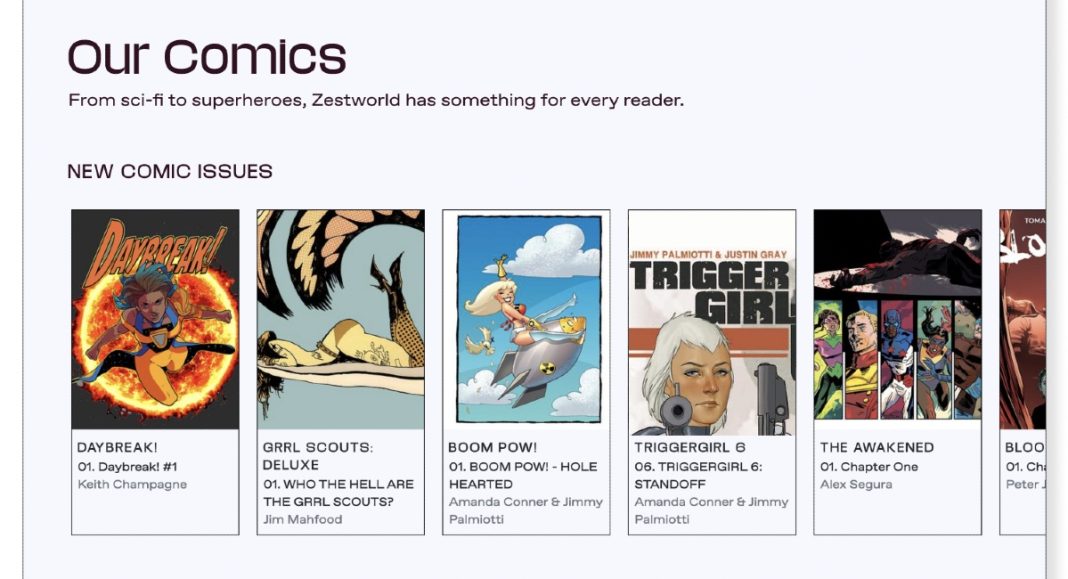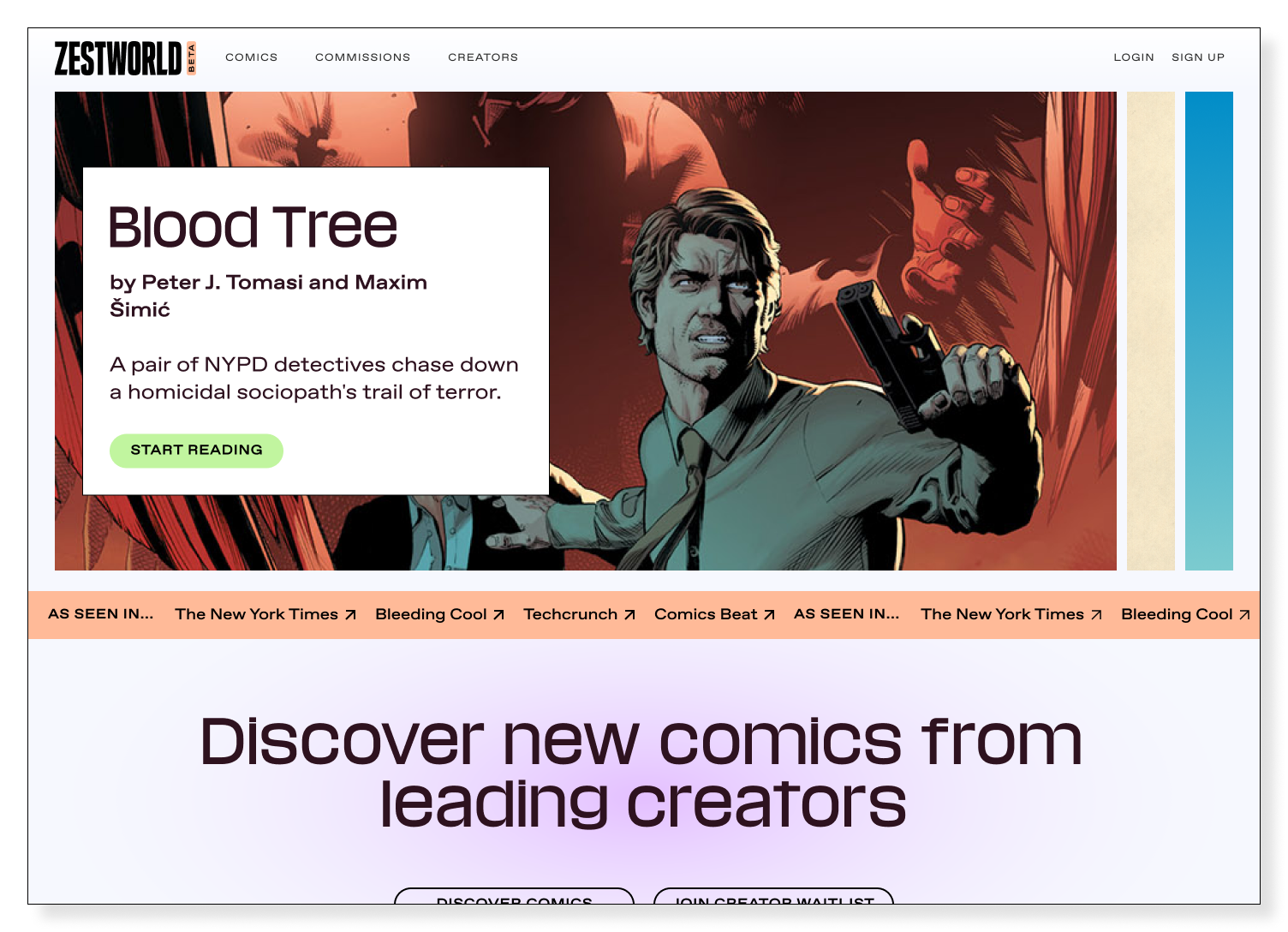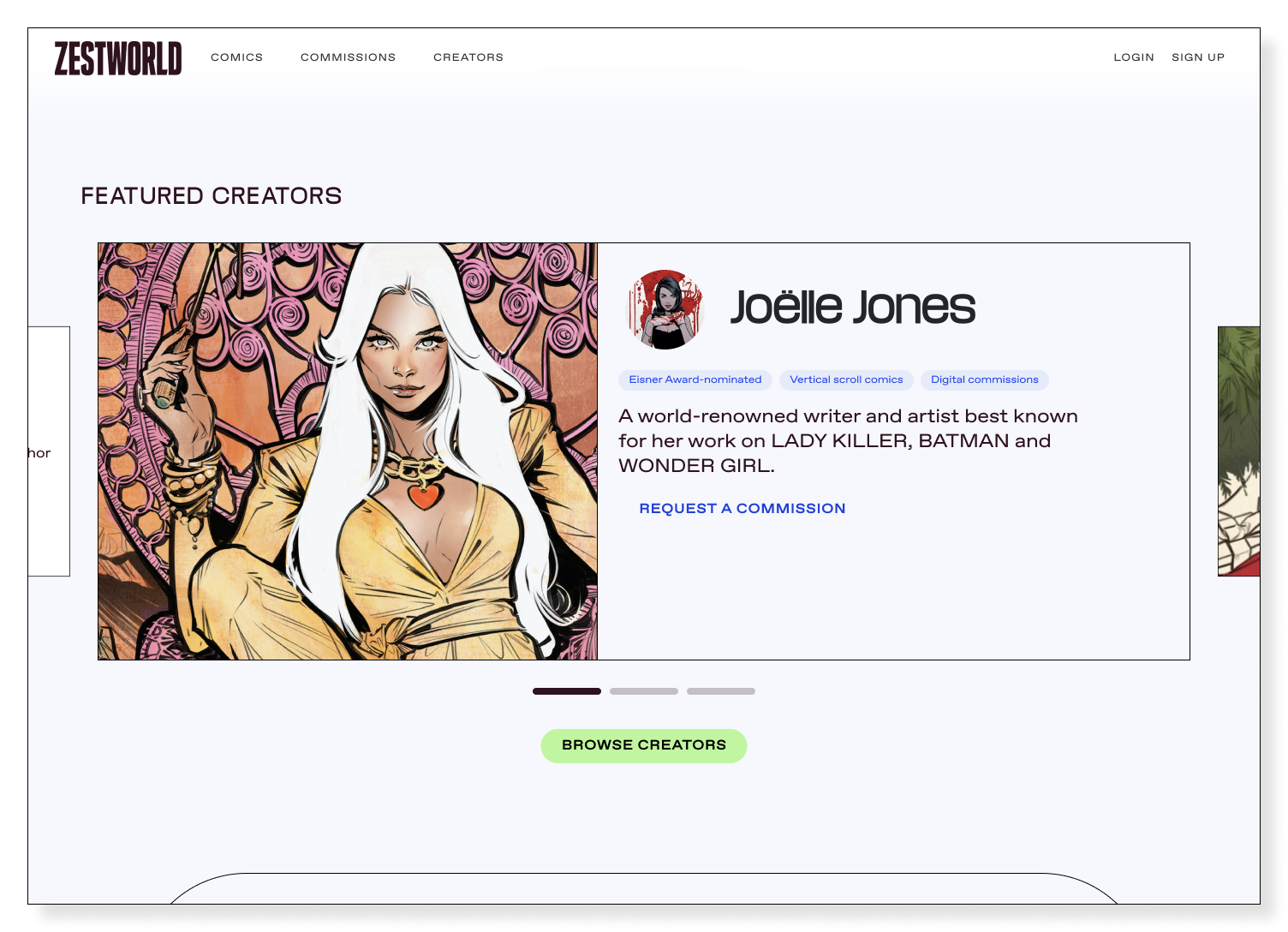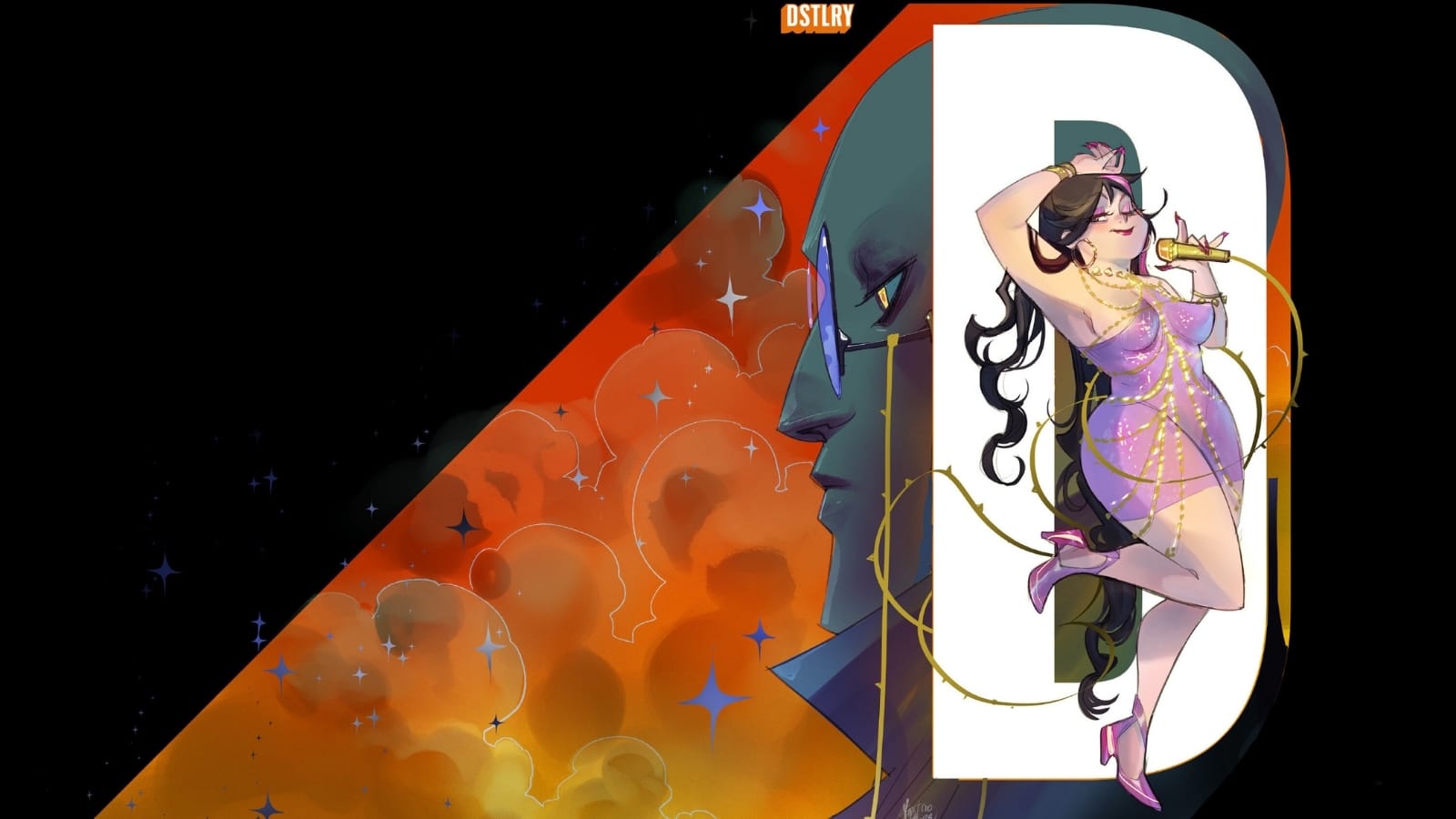Substack who? Welcome, the new creator-focused web-based platform, to the world of comics. Zestworld was announced in 2021 but officially launched in 2022. The company was founded by Chris Giliberti, who founded Gimlet Pictures, where he served as an executive producer for projects, including the Amazon Prime series Homecoming. While there, he was also featured on Forbes’s 30 Under 30 list.
With Zestworld, Giliberti wants to give creators more control over their intellectual property so that they can make more money off their creations, no matter what comic space they plan on creating in. To learn more about how Zestworld plans on helping creators wrestle back ownership of their brainchildren, The Beat caught up with Giliberti to discuss the basics of the platform, what it means for creators, and what it means for fans.

Rebecca Oliver Kaplan: What is Zestworld?
Chris Giliberti: Essentially, Zestworld is a creative platform, meaning that when artists and writers come to our site, we’re equipping them with the tools to build their businesses online and distribute their work. We are the most creator-friendly place for comic writers and artists to imagine a business, and what that means is the business structure that we offer in which artists retain 100 percent of their IP rights. We take only a 7.5 percent fee on their commission sales and their subscription fees—it’s just sort of best-in-class across the board. If you’ve been following the conversation around WEBTOON, essentially, this space of comics and the publishers and platforms that inhabit it, they’ve been good at servicing readers. What they haven’t been great at historically is taking care of creators. And that’s really what Zestworld exists to do, provide the best set of tools for creators to manage their business, whether it’s selling a commission or publishing a webcomic, we want to be the best place for creators to do that.
Kaplan: How did you come up with that 7.7 percent fee number?
Giliberti: We looked across all of the major creator platforms, and we asked ourselves, “How can we offer something new while also compensating ourselves for the infrastructure that we’re building because it needs to be attainable and fair?” And, pretty much across the board, your standard art dealer will charge 10 percent to manage that artist’s commissions and, in some cases, upwards of a 25 percent cut on the work creators generate. So we’re lower than that. We want Zestworld to be top-tier and competitive across all the competition.
Kaplan: So, is there a significant difference in commissions in the comic industry versus fine arts?
Giliberti: Well, many comic artists have dealers to manage their commission business, and it’s standard for those dealers to charge at least 10 percent.
Kaplan: How does your background as Head of Gimlet Pictures help you?
Giliberti: It draws quite directly on it. When I was a Gimlet, I served as executive producer on many TV shows, such as Homecoming, which got several Golden Globe nominations, so TV and film are my backgrounds – what I am known for. Historically, TV and film, with a few exceptions, have been very skewed toward the big publishers in the industry. We are eager to work with this community to give them tools to not only monetize but to retain and sell and to realize the upside on TV and film of their work. So, it’s going to be connecting my very traditional background in the space as a producer on TV and film with all of the technology and tools that we’re developing, and hoping to connect these creators with some great tools to make money because they’re retaining all their IP rights.
Kaplan: I heard that you aren’t focusing as much on NFTs as part of the digital commission purchasing. Why the switch? What role can NFTs play in the ownership of digital art?
Giliberti: We have never been a Web3 company. We’ve only ever viewed NFT technology as an arrow in our quiver for artists. This idea of an artist getting to participate in reselling of their work is very appealing, especially in a space like comics, where there are a lot of collectors who buy comic art as a collectible, and then they wind up reselling it. You see this at auctions where there are pieces of art that go is of art to go upwards of millions of dollars. So, if the artist has some mechanism to participate in those resales of their art appreciated, that’s exciting—and that’s always been the lens through which we viewed NFTs as a way for the artists to retain a footing as the value of their work appreciates.
We realize that it’s not right for everybody. In the NFT space, we’ve specifically on a blockchain polygon that is environmentally friendly and user-friendly in that there aren’t these exorbitant fees to transact on the blockchain. But regardless, we understand that this is all new and people have concerns about it, so what we’ve done is we’ve made it optional, both for artists and for fans. If an artist wants to sell their work as NFT, and it’s really important to them to pay them royalties down the line, they can do so. If they don’t want to sell NFTs, they don’t have to. We’re just here to tool up artists and their fans.
We built a blockchain where the transaction cost is low, and the carbon impact is low, as well. I like to think of it as the rough draft of almost every technology that is inefficient, and Bitcoin was the first blockchain, right? Think about how when we were all teenagers, and we had those computers that were these massive towers, and they were getting really hot despite being enormous spatially, and there was very little storage, and the REM was low. Same thing in the original rough draft of blockchain technology, which is really Bitcoin, much more than a lot of technology that is built on.
Kaplan: How does Zestworld find its talent?
Giliberti: Our awesome launch creators, Jimmy Palmiotti, Amanda Conner, Alex Segura, Joëlle Jones, and the list goes on, that was just us reaching out to people who we thought were awesome and who we thought our tools would be really helpful to them. From there, the industry has noticed, and we’ve built a big waitlist. Now, there’s more demand for our tools than there is capacity on our end on the platform. So, we’re reviewing all the wonderful people who have expressed interest and trying to get them on.
Kaplan: You talked about how the industry was broken in a previous interview with The New York Times. How does Zestworld aim to fix that?
Giliberti: For one thing, we strongly believe in the underlying IP rights of creative work and creators. So, we want to provide a business structure on Zestworld that allows creators to make money off their work and retain that creative and financial control over their work because we know Hollywood loves comics, right? Comics are the foundation of the biggest franchises in the world, and so there’s a lot there for creators, like, literally, hundreds of millions of dollars at stake here if you look at the history of the space. So, I would say that one big thing is that we believe that IP rights belong to the creators.
On the digital side, we haven’t seen a platform come to the table with a super creator-friendly structure, so we’re trying to do because a digital audience is really important these days.
Kaplan: What does Zestworld offer the reader?
Giliberti: Readers will flock to the destination with the best work [which is Zestworld] because all of the best people want to be there. We also just have great technology and great people building it. We have an exceptional team of engineers and product managers from Google, Twitch, and other platforms, and we are continuously asking ourselves, “What’s the best way to consume comic book content online?” So, we’re committed to creating the best experience for the fan. You can see that right now on our site. We have a great reader, and I think some features distinguish it from some of the platforms out there, like, there’s a nice infinite scroll feature that we just shipped. We’re gonna continue pushing the envelope there and continue building a better and better consumption experience for fans.
Kaplan: how does the commission process work for the fan?
Giliberti: The commission process is super simple. You go to the creator’s profile and see what they’re offering, a picture of what it might look like. You tell them what you’d like to buy from them. Hopefully, they’re down to do it, and then you get the art in your inbox or in the mail if they’re offering physical commission.
Kaplan: What are your plans for Zestworld in the future? Any up-and-coming projects that you can share?
Giliberti: The plans for the future are just to scale the community. We have this waitlist with hundreds of folks on it who are looking for a creator-friendly place to distribute their work and manage their commission sales. We’re also focused on growing the create population on the site so that we have more awesome comics for people to read, and we’re supporting more artists who need tools. So that’s one big area of growth ahead for us is growing our creator population. We are talking to many international artists. All of the creators on the platform currently are based out of the US, but that will be changing very soon as we invite more folks to join from the waitlist, and there are many international people on that list.
We are also working on our TV and film services. Hopefully, we’ll have some exciting news there in the coming months, but we’re beginning to support artists looking for a partner to help them sell their IP rights. And we are experimenting in that space as well.
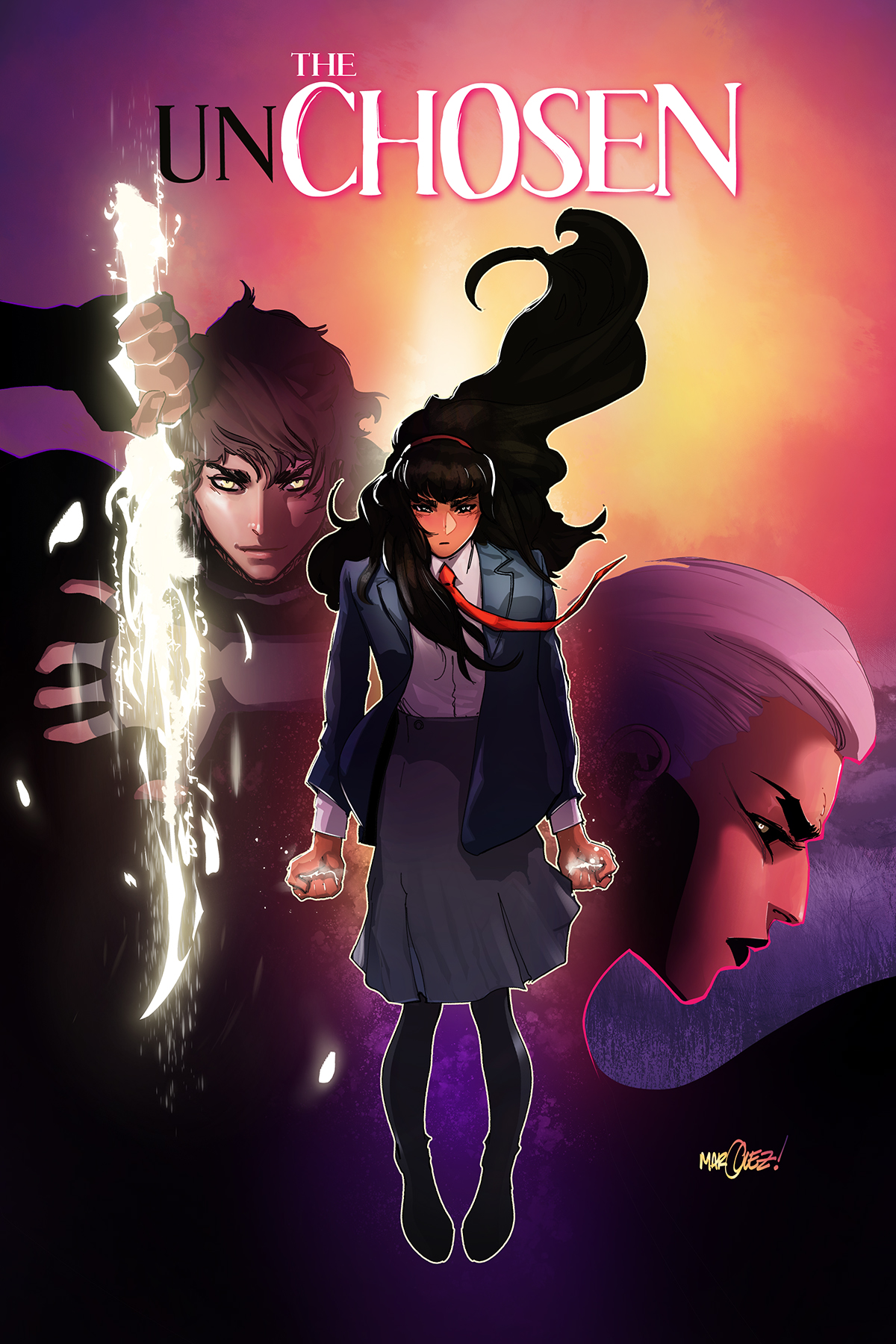
Kaplan: Is there anything else you want to add?
Giliberti: From a point of creator friendliness, one thing that is distinctive about what we’re doing is when someone subscribes to a comic on Zestworld, the creator gets to keep their email, the fan’s amazing email address, which is amazing. There are other platforms out there where you have webcomics that have gotten millions of views, and there are millions of people who subscribe, and the creator has no way of reaching them. On Zestworld, when eventually BOOM POW! by Conner and Palmiotti reaches a million viewers, and I think we all know it will one day because it’s amazing, Conner will have that contact information and can reach those fans directly, which she should because they’re fans of her work.
As a platform, we don’t want to disintermediate the relationship between the fan and the creator, we want to facilitate that. So that’s a huge stride forward and greater friendliness, like, you know, not abstracting away the fan’s identity with username, but handing over that information to the creators that way, you know, they could, you know, they could sell things to those people. They could build a real relationship in any number of different ways, but it’s their information because, you know, they’re the people that are directing the audience.
Check out the Zestworld platform today! Miss any of our other NYCC ’22 coverage? Find it all here!


